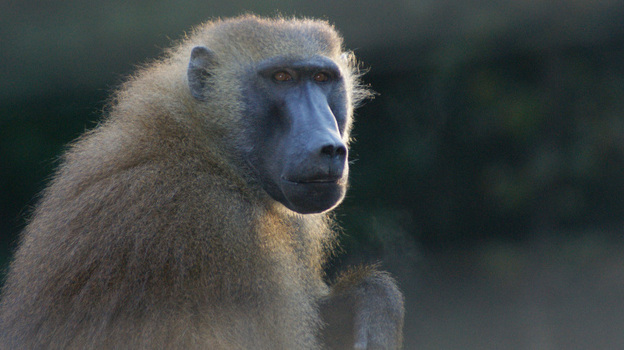We're open daily! View holiday hours
Science News
Monkey Business
April 13, 2012

It’s been a wild week of monkey business. Tuesday, we wrote about an amazing study of monkey social status reflected in their genome. It turns out that was only the beginning. This week has also seen research on primate sleeping habits, monkey mob-mentality and… reading baboons?
When did our human ancestors come out of the trees to sleep? It’s a debate among scientists—feet structure and fire-building evidence create theories that say, according to New Scientist, that
hominins may not have slept on the ground until Homo erectus appeared 1.9 million years ago. They lacked upper body adaptations for climbing and may have used fires to ward off ground-dwelling nocturnal predators.
But a new study of chimpanzee sleeping habits in Africa demonstrates that even our tree-climbing ancestors may have slept on the ground. Chimp ground nests are found even where chimps have large predators—indicating that ground sleeping could have started in hominins long before fire-building and feet adaptations.
ScienceNOW reports this week on a new study in Current Biology about chimpanzees and the mob-mentality. Similar to humans, it really is monkey-see, monkey-do—when the chimps watched their peers drop a ball into a box and receive a treat, they did the same thing. The researchers then tried it on human toddlers—they had the same response. According to ScienceNOW:
This moblike mentality makes evolutionary sense, the [research] group says, since doing what everyone else is doing is usually a good way to avoid hidden dangers.
Finally, we give you a study in the recent edition of Science about baboons that can tell the difference between a real word and a random mixture of letters. Not quite reading, but close, say researchers. NPR reports that this could say a lot about how our brains work to read.
“The part of the brain that we use to recognize words when we're reading is actually part of the more general brain region for visual object identification,” [lead author Jonathan Grainger] says.
Grainger says brain scans of people reading support that notion, though, of course, we also use language areas to understand what we're reading.
So many monkey studies, so little time… All important because they teach us about who we are.
Image: Joel Fagot